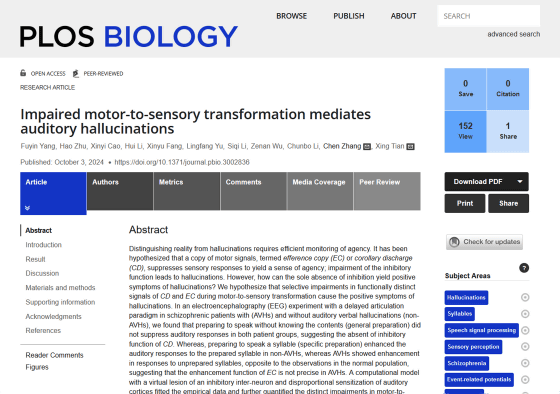The brain mechanism behind why schizophrenia patients hear 'auditory hallucinations' has been revealed

Schizophrenia, a mental illness that causes disorganized thinking and behavior, is characterized by a variety of symptoms, including hallucinations and delusions. Some
Impaired motor-to-sensory transformation mediates auditory hallucinations | PLOS Biology
https://journals.plos.org/plosbiology/article?id=10.1371/journal.pbio.3002836

What happens in the brain when a person with | EurekAlert!
https://www.eurekalert.org/news-releases/1059425
Scientists Identify Brain Signal Disruptions Behind Voices in Schizophrenia : ScienceAlert
https://www.sciencealert.com/scientists-identify-brain-signal-disruptions-behind-voices-in-schizophrenia
Fuyin Yang, a neuroscientist at Shanghai Jiao Tong University School of Medicine in China, and his colleagues conducted a study to investigate the mechanism by which schizophrenia patients hear auditory hallucinations. They examined the brains of 20 schizophrenia patients with auditory hallucinations and 20 schizophrenia patients without auditory hallucinations.
All subjects with schizophrenia were taking antipsychotic medication and were in a stable condition during the study. The research team also used previously collected data from people without schizophrenia as a control group.
In the experiment, subjects were asked to listen to short syllables and then speak the same sounds. The brain activity data of the subjects during this process was analyzed to see what differences there were between subjects with auditory hallucinations and those without.

The analysis revealed clear differences between people without schizophrenia, schizophrenia patients without auditory hallucinations, and schizophrenia patients with auditory hallucinations.
After the subject's brain processes the sensory stimulus of 'hearing a sound,' it prepares to make the sound. In people without schizophrenia, the brain produces a signal called a '

However, in all schizophrenia patients, the 'concomitant discharge' that suppresses the recognition of the sounds they make was lost. This makes it easier for schizophrenia patients to recognize the sounds they make as 'sounds heard from outside.' This phenomenon has also been confirmed in

On the other hand, in schizophrenia patients with auditory hallucinations, the efference copy was stronger than normal, even for 'internal speech' that one did not intend to utter. The combination of this reduced contingent discharge and the strengthening of the efference copy may make schizophrenia patients more likely to mistake their 'internal speech' for sounds they hear from outside, which may be the cause of their 'auditory hallucinations.'

'People suffering from auditory hallucinations are able to 'hear' sounds without any external stimuli. Disruption of the functional connections between the motor and auditory systems in the brain leads to a loss of the ability to distinguish fantasy from reality,' the researchers said.
◆ Forum is currently open
A forum related to this article has been set up on the official GIGAZINE Discord server . Anyone can post freely, so please feel free to comment! If you do not have a Discord account, please refer to the account creation procedure article to create an account!
• Discord | 'Have you ever heard auditory hallucinations?' | GIGAZINE
https://discord.com/channels/1037961069903216680/1291694237846601728
Related Posts:
in Science, Posted by log1h_ik







